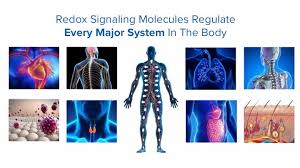Does REDOX Signaling help support mental HEALTH?
Redox signaling plays a significant role in supporting mental health by helping maintain cellular balance and protecting neural function, but direct clinical use of redox-targeted therapies is still under investigation.
Scientific Evidence
- There is strong evidence that oxidative stress—an imbalance in redox signaling—contributes to major psychiatric disorders like depression, bipolar disorder, anxiety, and schizophrenia.
- Redox-sensitive proteins and pathways influence neurotransmission, neurogenesis, synaptic plasticity, and stress response, all core aspects of mental function and mood regulation.
Therapeutic Potential
- Some clinical trials suggest that therapies improving redox balance, such as antioxidant supplementation, may help relieve symptoms of mental health disorders, but the underlying mechanisms are not fully understood.
- Interventions that target redox pathways—including dietary, lifestyle, and potential pharmacological approaches—are promising, but more research is needed before redox modulation becomes a standard treatment for psychiatric conditions.
Summary Table: Redox Signaling & Mental Health
|
Aspect
|
Evidence/Implication
|
|
Oxidative Stress
|
Linked to depression, anxiety, schizophrenia, neurodegeneration
|
|
Neural Protection
|
Redox signaling regulates stress resistance and neuroprotection
|
|
Therapy
|
Antioxidants show symptom relief in some trials; research ongoing
|
|
Causality
|
Clear mechanistic links in animals; some supportive clinical data
|
Overall, supporting healthy redox signaling appears beneficial for brain and mental health, but medical consensus and robust clinical protocols are still evolving in this area.
James Eckburg
REDOX HEALTH


